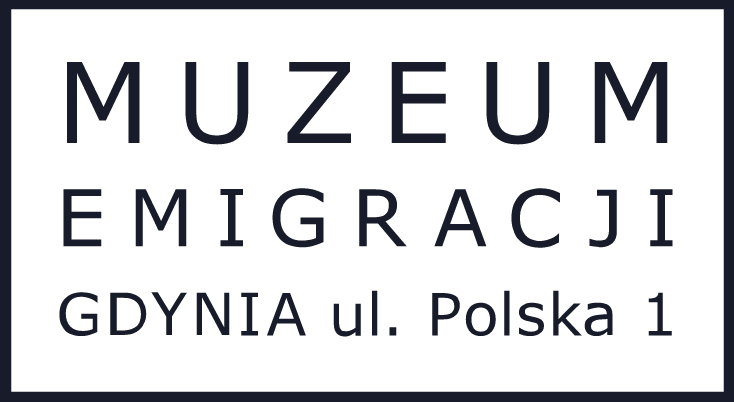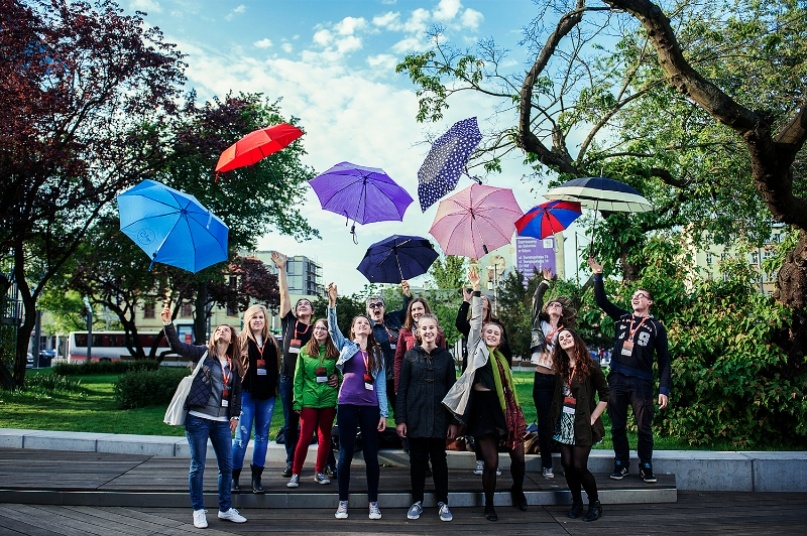What is volunteering? Who can be a volunteer? Why should we get involved? Agata Zielińska, the coordinator of the volunteering program at the Emigration Museum in Gdynia, had a little chat with two of our volunteers: Ada Kessler and Dominika Roter.
Miss Ada, Miss Dominika, during the Night of Museums we organized at the InfoBox, you coordinated the work of 15 people. The event attracted several hundred people who watched the exhibition, took part in the lecture, the urban game, and watched the film screening in the park.You assured the best possible organization of that event – did you and the other volunteers have fun doing it?
Dominika: It was a great experience. It was phenomenal to work with engaged, energetic volunteers.I was in a great mood on my way home after the event!
How did you come up with the idea of trying volunteering? Someone talked you into it?What event tipped the scale?
Ada: My mom, who comes from the countryside, used to say, „Strength through unity.” TOGETHER – to her, meant 'with someone’ and 'for someone’.She liked helping others and she had taught me this idea of coexistence in a community.Co-operation and helping others are natural goods that cost nothing and bring positive energy.
Dominika: During my studies, I worked with various institutions in order to familiarize myself with the functioning of cultural institutions.I wanted to learn as much as possible about working in this branch, about its behind-the-scenes, about what is takes to make a selected place of culture successful.The Emigration Museum in Gdynia had already caught my eye earlier and I have been observing the development of this institution from the very beginning, I think I haven’t missed any of the events.I am very happy I could enter the role of an event manager and co-create the Night of Museums event together with the EMG team.
What is the most interesting aspect of working as a volunteer to you?
Ada: How much one can accomplish with simple, partial tasks, how people of different professions can join their efforts in order to accomplish their common goal, that there is no age limit, no generational barrier.
Dominika: To me, working with the Emigration Museum in Gdynia is an attraction itself – to stand behind the wheel of a perfectly prepared event, to transform with fellow volunteers the concept of the Night of Museum’s program into a vibrant, exciting, and joyful happening.It gives great fun and satisfaction.
You both work professionally. What impact does volunteering have on your daily jobs? Does it help? Is it challenging?
Ada: Volunteering complements an entirely different sphere of life than work and home. It stems from the need to enroll in tasks that are frequently quite therapeutic.It is very difficult for a senior person (+55) to be in touch with the young generation, to be up to date with the intricacies of the modern world.Intergenerational contacts practically abolish such borders.One might say it works both ways: one needs to switch off from work, but switching off gives one strength to work too.
Dominika: It complements my professional work, helps in time management, and besides, I am a task oriented person – the more I have to do, the more energy and enthusiasm I have.
Ada, Dominika – what are your relatives’ reactions to volunteering?
Ada: I often hear, „How come you have the energy to do it?”, but also, „I regret not doing it when I was younger…”
Dominika: They are happy I feel fulfilled in the area of cultural animation. They know it inspires and drives me to walk my own path.
What are the most untrue preconceptions of volunteering you have encountered?
Ada: Volunteers are naive people (even stronger – losers) used for boring tasks someone has to complete eventually, brrr….
Dominika: Unfortunately, many common opinions are justified in the case of many cultural institutions that rely on volunteers’ work.In the Emigration Museum, every volunteer is interviewed about their ambitions, what it is they would like to do, so everyone can find their space of activity if they only want to.
Based on your observations, are there any personality traits that may come in handy to a volunteer?
Ada: Sense of responsibility, positive attitude to people (and to animals, an advantage), openness, sense of humor, healthy distance from oneself.
Dominika: Good time management, openness, and – I agree with Ada – responsibility too.
Who usually decides to try test their skills in volunteering? Younger or older people? What is it they seek for?
Ada: It’s hard to be 100% certain, the reality is formed by various people who are motivated by different things. There is no rule of thumb, no age limit. We all seek fulfillment: younger people want to prove that they can,older ones want to feel a new kind of energy.
Miss Ada, what is the benefit of being a volunteer? What is it you gain from being committed to it all day (and evening) long?
Ada: Stressful and financially responsible work pushes me to look for something that would allow me to feel good and fulfilled.Being engaged in other than routine tasks frees my positive energy.It’s my added value.
Dominika, how would you encourage others to join the EMG volunteering program in one sentence?
Dominika: It is an institution of culture, that offers co-operation based on a modern model of volunteering that meets international standards, is fair, and transparent.
_________________________________________________________
Want to know more? Learn about the Culturally [Co-]Operative Program!


